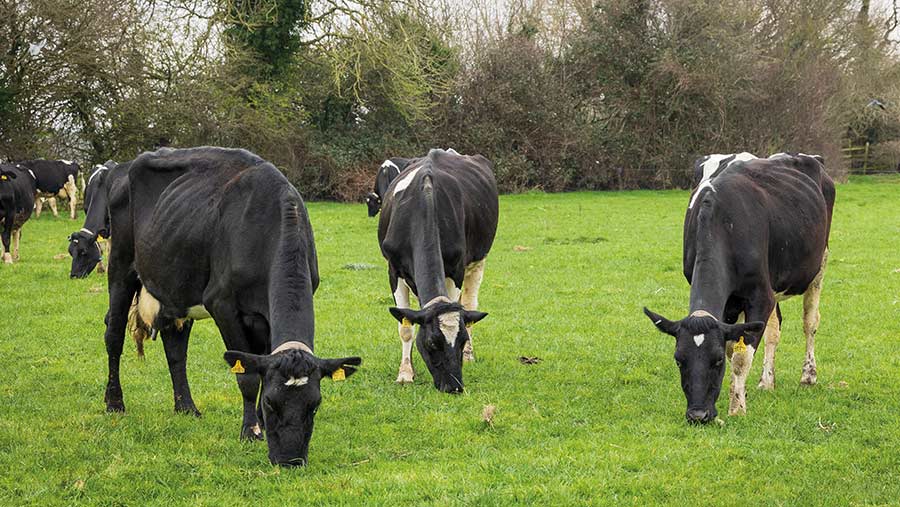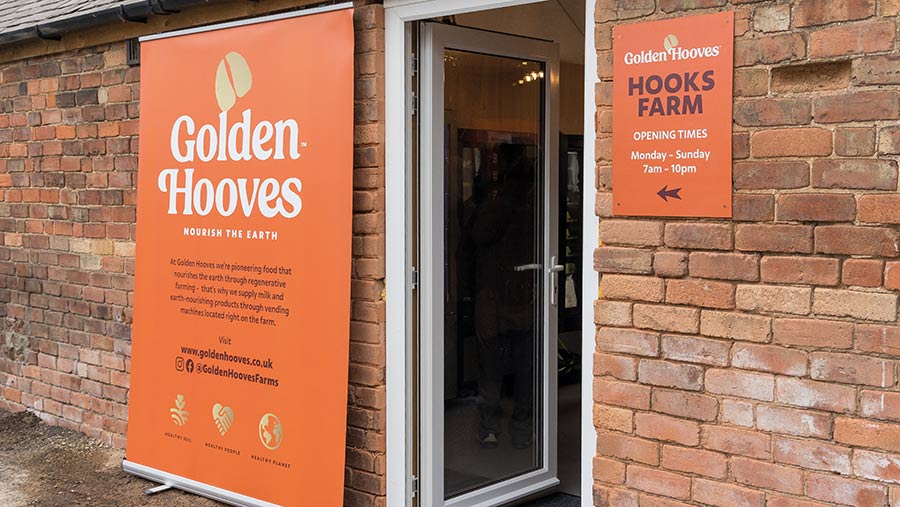Why the on-farm milk vending market has soared
 © Louise Allen Photography
© Louise Allen Photography The market for milk through on-farm vending machines has soared through the pandemic as more consumers shop locally.
Daniel Saunders, business support at milk and produce vending machine supplier The Milk Station Company, says there are roughly 400 milk vending machines throughout the UK, with their business accounting for about 75% of the market.
“We have upwards of 300 machines across the UK, including Ireland and the Channel Islands.
“The growth in milk and produce vending for farmers located across Europe and the UK reflects the growing consumer interest in sourcing products that are produced in their local area, invariably right on their doorsteps,” he said.
See also: So you want to… set up a milk vending machine?
What is the average cost of setting up an on-farm vending machine?
An average cost, to include a pasteuriser, would be in the region of £30,000, according to The Milk Station Company.
“Customers usually buy the machines outright as they often pay back within a year, however there are some who choose to rent or lease them,” says Mr Saunders.
What is the demand?
Footfall increased across all customers’ sites during the pandemic, according to Mr Saunders.
“Since restrictions were eased, and ultimately relaxed, demand for these machines has continued.
“The demand has also led to additional machine purchases across existing customers, as well as word of mouth and social media presence promoting new customer enquiries and purchases.”
Is planning permission needed?
If you are creating a building on a site where none existed before, it is likely that planning permission will be needed.
However, most customers repurpose existing buildings, says The Milk Station Company.
Is insurance necessary?
Chris Walsh, farm specialist at NFU Mutual, says he continues to see interest in farm retail through farm shops and vending machines, but notes that bringing the public on farm and selling produce direct can introduce new risks.
“Public and product liability insurance is a top requirement for customers accessing the machine in case of an accident when using it or consuming the product.
“It’s also important to check your farm policy for where the machine is situated to check the cover extends to property damage and theft for machines and stock if located away from the farm,” he says.
“You may also want to consider business interruption cover, particularly if the vending machine is out of operation and is generating a significant income,” he added.
Mr Walsh advises when embarking on a new venture, to consider insurance and risk management from the beginning as this will ensure there are no issues in obtaining cover and that you have fully costed your plans, so the business case still stacks up later.
“Keep reviewing the sums and values you are insuring to avoid underinsurance and let your insurer know if you are going to employ more staff or take delivery of new equipment or stock during the year. For example, milk prices and equipment have risen sharply.”
Advice from farm milk vending site operators
Farmers Weekly spoke with several producers already operating milk vending machines for their tips for others considering the venture.
- Location is key to attract a large footfall, with a high population density needed locally for best returns.
- Off-farm milk vending machines can also work well at campsites or farm shops, especially if producers don’t want to deal with the public directly on farm.
- Consider initial start-up costs, depreciation of equipment, and time spent refilling the vending machine each day, when looking at the potential margins for the enterprise. Time taken filling and emptying machines typically takes up to an hour a day, however, this can be longer if machines are located at other sites away from farm.
- Food safety requirements will need to be met and a food hygiene certificate will be essential as well as a Hazard Analysis and Critical Control Point (HACCP) Plan.
- Local authorities may also require premises to be classed under EC 853/2004 as an approved premises for selling food, depending on the volumes of milk sold.
- Milk should also be tested regularly in line with Food Standards Agency standards. Local environmental health officers should be able to advise further on specific legal requirements.
First Milk rolls out on-farm vending machine franchise
Members of farmer co-operative First Milk can tap into the vending market through a different route with the processor’s vending machine franchise scheme, to sell milk and cheese under its new Golden Hooves brand.
The brand has a heavy focus on regenerative farming methods and will work with producers who are applying regenerative principles on farm.
Stuart Donald, Golden Hooves lead at First Milk, says: “There are two sites up and running and the plan over the next 18 months is to get that up to about 20-25 sites.
“We have launched Golden Hooves to be a brand platform to tell the regenerative farming story and to connect the consumer with the people and the product,” he says.
First Milk may over time branch out into further dairy products under the new brand.
The sites will also have a produce vending machine selling foods such as jams, honey, cream, and butter, all sourced from local businesses that also follow regenerative principles.
Franchise agreement
First Milk will operate a franchise agreement with all of its sites, which will produce pasteurised, non-homogenised whole milk.
Agreements and costs will vary between farms but include a franchise fee and a small percentage of the profits from sales going to First Milk, as is typical with most franchise agreements.
First Milk will provide the branded vending machines but the pasteurising equipment must be paid for and installed by the farmer franchisee.
Small pasteurisers typically cost between £6,000 and £15,000 for units capable of processing between 100 and 500 litres a day.
The milk co-op will also offer franchisees marketing, business, and admin support, including ordering products for the produce machines.
Mr Donald says: “We are able to provide that overarching brand and also social media plans, training and support to help drive footfall.”
Case study: Hooks Farm Dairy, Borrowash, Derbyshire
The Smith family opened the first Golden Hooves milk vending machine on their farm near Derby earlier this year.
The 51ha grass-based dairy farm milks about 50 cows through a robotic parlour.
Brothers Dan and Adam Smith are the third generation at Hooks Farm and helped expand the dairy enterprise with the installation of a simple milk vending machine in 2018, with an honesty box for payment.
The farm is on the urban fringe near a highly populated area, which has helped demand.
After originally selling about 150 litres a day, demand rose to 200 litres a day during the height of the pandemic.
The business also introduced 18 flavoured syrups for milkshakes.
Hooks Farm was approached by First Milk in autumn last year to operate the first Golden Hooves site.
A milk vending machine and produce vending machine has since been installed.

© Louise Allen Photography
Added value
Dan Smith says: “Trade is now at about 300 litres a day and more at weekends. Additional revenue is now also coming from sales of cheese, butter, and cream from other local First Milk farms.”
This gives others who don’t have an outlet the opportunity to also add value. The cheese is marketed under First Milk’s Golden Hooves brand and other products are being trialled, says Mr Smith.
Average spend for each customer has almost doubled to about £7, according to Mr Smith.
Milk sells for £1.20/litre, £2 for two litres and 80p for 500ml, plus 50p for a syrup shot for milkshakes.
Further expansion is being considered, with potential for ice creams and coffees to be added to the current offering.
“As well as the financial benefits, it is also just so enjoyable and fun when you can interact with your customers and every litre of milk has got a story behind it,” says Mr Smith.
“We chose to work with First Milk for their help and knowledge to guide us through. The Golden Hooves team has really helped us with the marketing and social media and regenerative side of the business.”
All of the Golden Hooves vending sites will be selling pasteurised milk, so the farms have to invest in an on-farm pasteuriser.
Mr Smith says the initial cost of purchasing their pasteuriser several years ago was £12,000.
